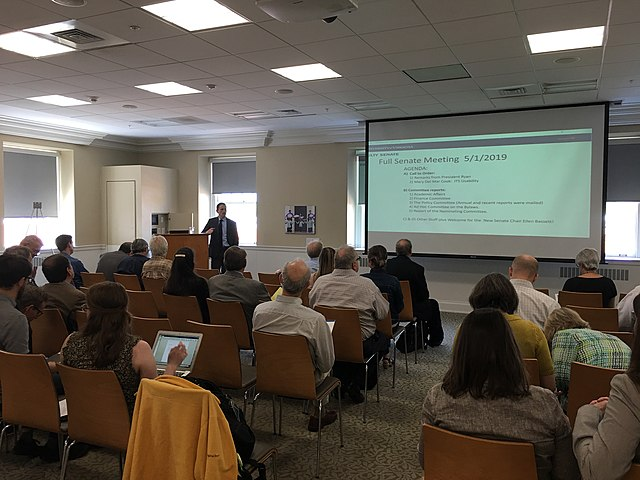
(Not an actual Oxford Town Meeting)
Creative Commons — Attribution-ShareAlike 4.0 International — CC BY-SA 4.0
In a scene that has become common in Oxford in the last six months, the meeting room at the Oxford Town Office was filled to near capacity with residents of the small town as the Town Commissioners conducted their regularly scheduled meeting on Tuesday, September 12.
Prior to the general meeting, the Commissioners held a work session with the public to review and possibly change the recently passed Town Charter Amendment requiring elections for finishing the terms of Town Commissioners who leave office early. Town Lawyer Lindsey Ryan worked with Commissioners and citizens to adapt changes to the amendment. The changes will be collated and presented again at a later date for more review and adoption. The amendment was overwhelmingly supported by a resounding majority in a town election earlier this summer.
Once a tribute to the first responders and victims of 9-11 and everyone said the Pledge, department heads did their reports. Tim Kearns, Oxford Volunteer Fire Company thanked the community for the support of their breakfast on the 10th and the funds they raised to purchase a power stretcher for the ambulance.
When reports were done, the Commissioners unanimously passed Resolution 2309, which will allow the number of Oxford election supervisors to increase from six to nine and make their terms start from when they are appointed.
The Commissioners decided to shelve the vote on the agreement with Easton Velocity internet until a later date.
That was when the meeting got more energetic. At a previous meeting, Commissioner Greer had introduced the possibility of investing the almost 4 million dollars of town funds into the Maryland Local Government Investment Group to increase the interest on this money to almost five percent rather than the rate provided by Bay Vanguard Bank. Bay Vanguard has a branch in Oxford. In three months, moving the money would have given the town income of approximately $30,000 in additional interest.
Town Manager Cheryl Lewis, who currently makes the decisions on where to put the town's funds, reiterated that she was concerned that if they moved the money out of Bay Vanguard, the bank would pull their branch out of Oxford. She also stated that Bay Vanguard said they will increase the interest rate on all the money to 4%.
Commissioner Greer asked if any other banks had been investigated by Lewis, since Greer found several local banks who would offer 5%. The Maryland Local Government Investment Group offered 4.96% in April. Again, Lewis said she was concerned that Bay Vanguard, a bank based out of Baltimore worth $848 million, would leave Oxford. She claimed that many of the Town's elderly residents depend on the bank and would not be able or willing to drive to Easton to do their banking.
When one citizen pointed out that any additional money coming to the town from interest might be used to lower ever increasing water bill prices, the Town Manager Ms. Lewis snickered. That reaction was not well received.
At this point, residents expressed their ideas. One gentleman who lives near the bank said he saw very little activity at the bank or its ATM and that was mainly from visitors to the town. Another pointed out that residents often drive to Easton for services and goods not available in Oxford, such as gasoline and this would be no different. Others questioned why the town was making decisions to benefit a large bank rather than the small community.
After some discussion regarding the safety of money, Bay Vanguard's falling stock price, and a reminder that the Commissioners have a responsibility to manage money to the best benefit of the citizens, Commissioner Greer suggested that the town enlist the services of a committee of financial advisors to help with money management and create a process that could be used to make financial decisions. This was backed up by a citizen who pointed out that none of the Commissioners nor the Town Manager had a background in finance or money management.
One Commissioner, Ms. Botkin, who was appointed in March after she came in second in the two-person election, pointed out that the Town Manager was the Treasurer of the Town and was charged with these duties and that she should be able to continue to do them. However, as a citizen stressed, audits of town finances in previous years had shown that flaws in the Oxford money management process are the lack of advice from finance professionals and the fact that the office of treasurer and town manager should be separate for transparency purposes. No one had mentioned that possibility prior to Ms. Greer taking office.
At this point a motion was made by Ms. Greer to move the funds to the Maryland Local Government Investment Fund. In what appeared to be a sudden reversal of his previous stance, Commission President Tom Costigan seconded the motion. Greer and Costigan voted yes to the motion. Botkin voted "no."
After the vote, the Town Manager went on to discuss other less volatile issues including hurricane preparedness and other town projects.
While Oxford is a small community, it is apparent citizens in this small town are making it clear to their hired and elected officials that the people of the town demand a say in how the town is run and who is making decisions.
In the past, town meetings may have hosted five or fewer community members. Commissioners and Town Staff could make decisions unilaterally without anyone noticing. This is no longer true. Recent personnel and other decisions have caused people to take notice and get involved.
Is this a trend across the county, state, and country? Possibly. Are we coming to a point where people are fed up with being discounted by elected and hired public officials? Based on Oxford, the answer is "yes."
The genie, as they say, is out of the bottle.
